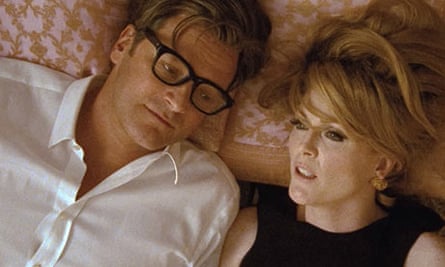

Based on the Charles Isherwood novel of the same name, A Single Man is the story of George, played by Colin Firth, a college professor in Los Angeles in 1962 who is trying to cope with the sudden death of his longtime partner. Taking place during one day eight months after the loss, the film takes us through George’s routine, from getting out of bed to teaching a class to running errands and having dinner with his best friend, played with usual brilliance by Julianne Moore. All of these normally mundane acts would seem like regular, thoughtless moments in an everyday existence for most of us, but, for George, they make up surreal pieces in a puzzle of his life that has become increasingly less coherent, as his world since the loss of his love has spiraled not only out of control, but out of any sense of meaning. He is a man burdened by the weight of unimaginable grief.
What could easily have become tragedy or melodrama instead becomes an immersion of character, of setting, of time and place and all that should have been, and all that could not have been. Ford perfectly captures the tragic limits to George’s grief allowed by society and the times he is living in. We’ve seen the “suffer in silence” theme before, but never has it been drawn so deeply, so intimately, and so wholly. Ford, who also wrote the screenplay (adapted from Isherwood’s novel) and produced the film, introduces George to us slowly, carefully, but never reveals him fully. There’s always the sense that there’s something we don’t know—and that’s because there is.
The way the film reveals itself is sheer poetry. It is graceful and elegant, a slow-motion symphony of light and sound. Yes, it is gorgeous to look at, as you would expect from the eye of a director whose roots are in fashion, but what makes this film truly significant is the performance of Colin Firth, who plays George. Firth is an actor of unbelievable talent and he finally gets the chance to show off what he can do. He will be rewarded at Oscar time with a Best Actor nomination for this absolutely haunting performance. Firth is restrained and stoic, but George’s heartache is palpable and you can feel it almost seeping out of his pores.
There are a few moments where you can see that Ford does too much and you can feel him over-reaching to make an emotional connection with the audience, and there are a few times that he does get a bit arty, but it doesn’t distract too much. There certainly is a lot of style in this film, from the swelling, gorgeous orchestrations (by Abel Korzeniowski), which definitely set the mood and tone throughout, to the stylish shots and the filtering that Ford gets a little too carried away with. Still, this film doesn’t need any extra trickery, as Firth’s performance is enough to make it a viscerally emotional experience.
It needs to be said that A Single Man is a weighty experience. It explores loss and grief and sorrow and hopelessness—seriously heavy themes. If you’re not prepared going in, then you’ll be in for a rough ride. But as long as you expect a good movie with great acting and a heavy heart, A Single Man will deliver some poetic justice.
